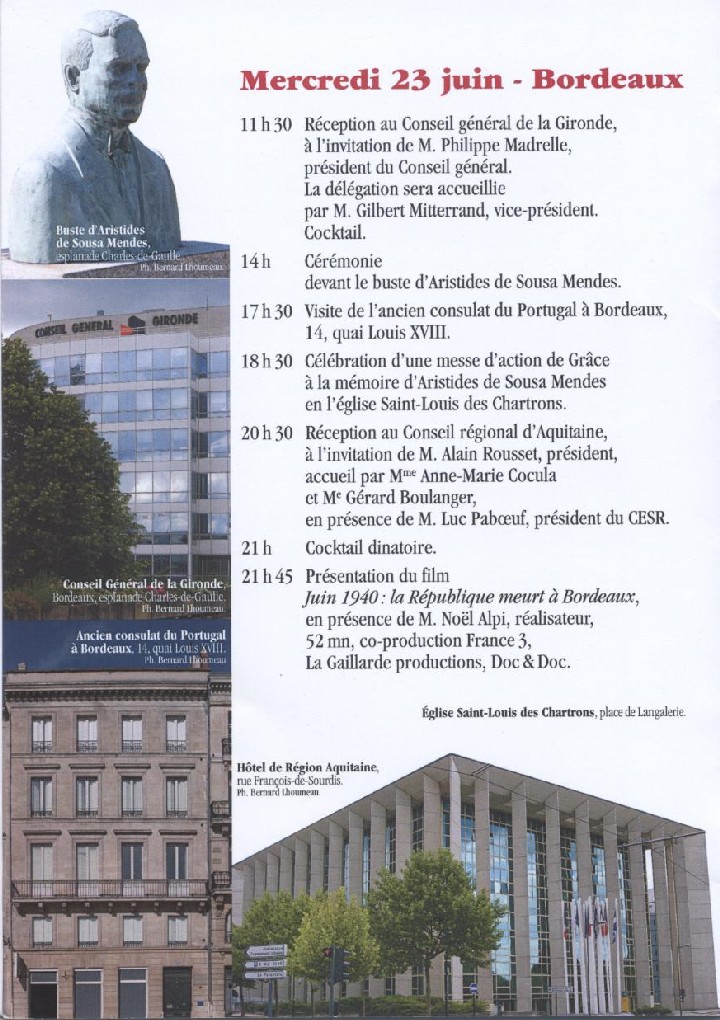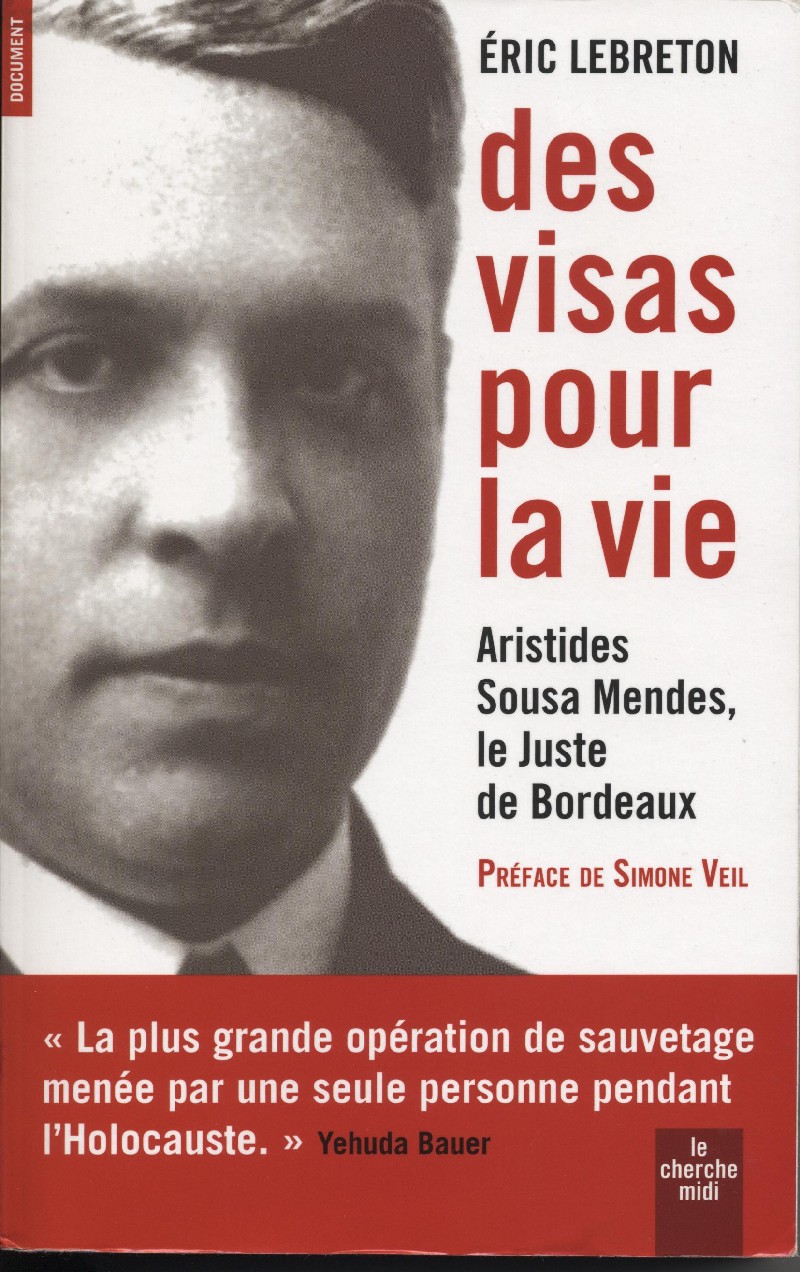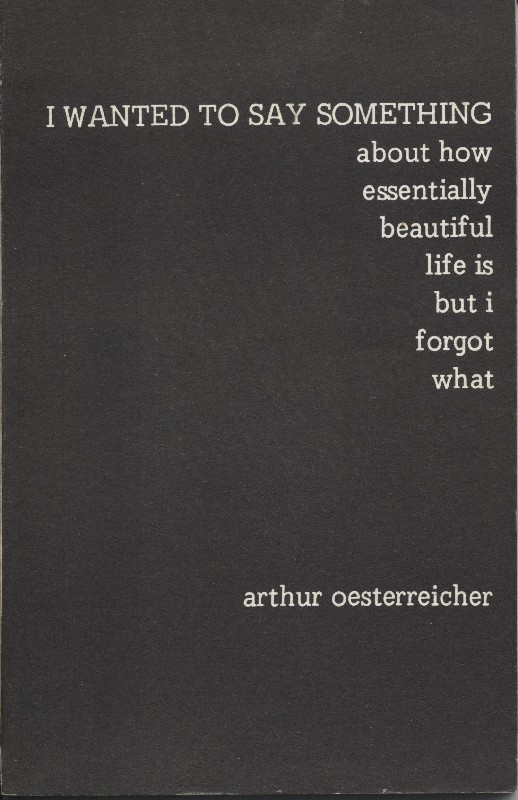We board the 7AM train from Paris to Bordeaux, and I share a compartment with two of Aristides de Sousa Mendes’ grandsons, Gérald and Sebastian Mendes, and Lissy Jarvik’s son Jerry. Jerry happens to live very near me in Seattle and is a research doctor at the University of Washington. Sebastian Michael Mendes also lives in Bellingham where he is a professor at Western Washington University. He is also a talented scultpural artist. We get to know each other a little better during the journey; topics include Jerry’s neurological research and Sebastian’s experimental music radio program, Gérald is interested in hearing about my interest in Neil Young, and so I talk a little about his music and career, and relate some of my experiences traveling to concerts and meeting fellow fans from around the world. The train passes Poitier and we discuss the prehistoric cave paintings in Lascaux. Jerry Jarvik shows us copies of the visas Lissy's family werre granted in 1940, and Manuel Diaz presents us with copies of Eric Lebreton’s scholarly book entitled "Des Visas Pour La Vie: Aristides de Sousa Mendes, le Juste des Bordeaux" en route. |
|
We arrive in Bordeaux a little after 10, are taken to the Hotel Alton west of the city center, and then attend a reception at the Conseil Général de la Gironde (a department of the region of Aquitaine). We are received by Gilbert Mitterand, vice president of the council and son of former president Francois Mitterand. Louis Philippe Mendes of Montreal and Aristides Sousa Mendes of Portugal make short speeches, and the entire delegation is acknowledged and presented with a gift of two books, "La Seconde Guerre Mondiale en Gironde" and "La Gironde en 101 Monuments" to add to our growing suitcase libraries. Over champagne I had the great pleasure of meeting the delegates from the Habsburg (or Hapsbourg) family, Gerhard Dressler, President of the Habsburg Foundation and Eva Demmerle, biographer of Otto von Habsburg (now 97 years old and living in Bavaria). They were both very warm and interesting people. M. Dressler spoke to me about life in Bavaria, his career, and also his experiences as a young man traveling in the United States and the difficulty he had starting work in the US. I mentioned my own desire to live and work in Europe and the similar obstacles I would face. We concurred that the issue is not so much with one’s capability or even in finding the opportunity so much as it is in getting legal permission. Eva Demmerle spoke about the danger faced by the Habsburg princes at the onset of World War II, and how Sousa Mendes provided the royal family with visas. She told me that Otto von Habsburg told President Roosevelt about Sousa Mendes’ role and urged the diplomatic corps of the US and South American governments to issue additional visas to refugees. We then walked along the Esplanade Charles de Gaulle for a ceremony at the statue of Aristides de Sousa Mendes. I walked with Marcel and Betty Weider, representatives of LICRA (International League against Racism and Anti-Semitism) from Périgeueux. I shared my story with them and learned a little bit about their experience as Jews surviving the holocaust and the families they lost. |
|
Marie-Rose Faure, the youngest daughter of Aristides, joined the delegation in Bordeaux, and provided a very personal dedication for the monument to her father. Additional remarks were made by actor Armand Eloi and author Eric Lebreton. Manuel Diaz asked me to join Marie-Rose and Ana Margarida Navarro Mascarenhas (granddaughter) in laying the ceremonial wreath at the base of the statue – a great honor for me, needless to say! Hellen Kaufmann invited Armand, Eric, Kevin and myself to her home. We then walked into the city center and lingered over tea and cakes beside the Notre Dame church. Among other things, we talked about travel and music, and I found that Eric Lebreton and I have similar tastes. The five of us enjoyed each other very much during this interlude in the day’s program. |
|
We next visited the site of the Sousa Mendes home and consular office in 1939-40, along the banks of the river Garonne. It was here in June of 1940, while Bordeaux was swarming with refugees from Paris and from other nations overrun by the Nazis, that Aristides de Sousa Mendes made his decision to save as many of the refugees as he could. From June 17 through June 19, working with Rabbi Kruger, his wife Angelina and two of their sons, they set up an assembly line to stamp visas all through the day and night. Although we were unable to visit the actual second floor apartment, the resident in the third floor apartment (which has the exact same floor plan and layout) graciously allowed us to tour his home. |
|
This was followed by a special mass for Aristides de Sousa Mendes at l'église Saint-Louis des Chartrons, the Catholic church where he worshipped and may have made confessions over the conflict of morality versus duty to his government. The service was lovely; I especially enjoyed the singing of the choir and the quality of late afternoon light through the stained glass. There was a moment when we were encouraged to greet and embrace those near us in the pews. Armand Éloi described this is a gesture of friendship, and I was grateful to be near him and the family of Aristides de Sousa Mendes. The mass was attended by the current consul general of Portugal in Bordeaux, Manuela Caldas Faria, and I introduced myself to her on the steps of the church after the service. I showed Eva Demmerle of the Habsburg Foundation the travel documents of my grandparents and my father’s book of poetry, and we had a little talk about ethics, causality, and life as a child of the post-war period, while walking back to the tram line on the quay. |
|
The evening reception was at the Hôtel de Région Aquitaine. This was our biggest reception, hosted by Gérard Boulanger and Anne-Marie Cocula of the Conseil Régional d'Aquitaine. Regional policy-makers and business leaders were in attendance, and although there were a lot of people, I felt a bit isolated, even lonely, during this reception. |
|
excerpt of journal entry, written 24-June-2010 in Bordeaux After the opening remarks, Lissy Jarvik made a very moving speech before the assembly. She expressed deep gratitude for her life and the opportunities she had to get an education, have a career, find love and a husband to share her life with, and the joy of her two children. Lissy reminded us all of the importance of remembrance, to transmit the story of Sousa Mendes to future generations, that it may serve as an example of what one person can achieve, and of the far reaching implications of saving a life. During her speech I felt a great closeness to, and great longing for, my own father. I wept for all of those lost in the Shoah, and for those who survived the war but who are no longer with us. I felt a certain loneliness and regret for the parents I lost at an early age, especially seeing the great love between this wonderful mother and son, and I must confess I also wept for myself. |
|
The Conseil provided the most amazing catering of any event I have ever attended, referred to in our program as "cocktail dinatoire" -- I wish I had taken pictures of the food! There were delicacies of many kinds, from paté to caviar, hors d'œuvres and amuse-bouches, an astounding array of cheeses, petits-fours, ice cream and frozen custard, and of course, fine wines from the Bordeaux region. These delectable treats cheered me up a little, as did attention from a very chic looking couple who asked me about my background and participation in the delegation. A gentleman from the Conseil also spoke to me, seemed to find my story compelling, and asked me two very salient questions: |
|
For the evening's finale, we entered the very modern council chamber to watch a film entitled "Juin 1940: la République meurt à Bordeaux" - a documentary that details the political events of June 15-17 in Bordeaux, dissension between the defeatists who want an armistice, and those who want to continue to resist the German invasion. Much of the action takes place in the Prefecture of the Aquitaine Region, which we will visit tomorrow. The film was made for France Television, lacked subtitles, and made me very sleepy. I managed to stay awake for the presentation, thanks to my friend Kevin who provided some translation and much empathy. A short tram ride brought us back to the Hotel Alton. Truly exhausted afterwards, I nevertheless wrote the day 's journal entry (twice, due to operator error) in my hotel room. |




